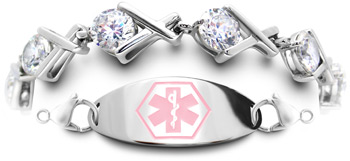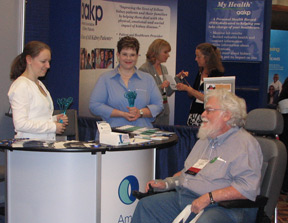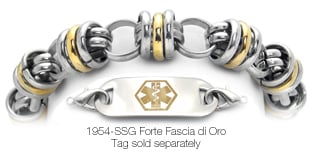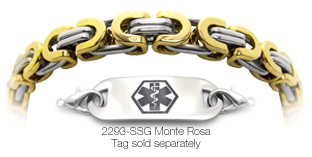10% goes to AAKP
You have arrived at Medical ID Fashions where 10% of your purchase of a medical ID bracelet goes to the American Association of Kidney Patients. Protect yourself while helping AAKP in its mission of improving the quality of life of kidney patients through education, advocacy and the fostering of patient communities.
Click Here to learn more about AAKP.
Membership to AAKP is FREE! Join Today.
AAKP is proud to partner with Medical ID Fashions.

Buy from many styles to help the AAKP
What AAKP is doing for kidney patients


Buy from many styles to help the AAKP



Facts about Kidney Disease
Kidneys are like a 24-hour cleaning machine for your blood. Kidneys are twin organs shaped like kidney beans. They’re located below the rib cage in the middle of your back. In adults, each kidney is about the size of a closed fist. The kidneys are joined to your bladder by tubes called ureters.
These tubes carry urine from the kidney to the bladder. The kidneys filter your blood and make urine. The bladder holds the urine until your body gets rid of it when you urinate. Each day, the kidneys pump about 200 quarts of blood through 140 miles of tubes and millions of filters. Though most people are born with two kidneys, some are born with one kidney and lead normal lives. People can live a near normal life with as little as 20 percent of their total kidney function.
Most people don’t know all of the things kidneys do to keep them alive and healthy until something goes wrong.
The kidneys:
• Remove waste products from the blood. As your body works, it builds up waste products that need to be removed. The kidneys are the “garbage collectors” that remove the waste from your body in the form of urine. If it were not for the adequate removal of toxic substances in the urine, as well as in the stool, we would become ill.
• Remove extra fluid. Kidneys get rid of the extra water in your body.
• Adjust levels of minerals and other chemicals. The kidneys balance important minerals and chemicals in your body like sodium, potassium, calcium and phosphorus. For example, if you eat a lot of salt, the kidneys will get rid of the extra you do not need. It’s important that these chemicals remain balanced in order for your cells to function correctly.
• Produce hormones. Kidneys make hormones (chemical substances that get in the blood stream) that help control your blood pressure. They also help to make red blood cells that carry oxygen to your whole body. The kidneys produce a hormone called erythropoietin (EPO) that stimulates red blood cell production by the bone marrow. Without EPO, red blood cell production declines. This results in a condition known as anemia. Anemia causes extreme fatigue and overall weakness. Kidneys also make vitamins needed for strong bones.
Chronic kidney disease (CKD) is a condition where the kidneys are damaged. Kidney damage can be estimated using the serum creatinine, persons age, race and gender. This calculation is known as the eGFR. Damage can also be proved by using markers such as the urinary protein or by documenting unusual findings on imaging studies such as the renal ultrasound.
Kidney disease is divided into 5 stages, based upon the eGFR levels measured over at least a 3 month time frame.
Stage 1 (≥ 90 ml/min)



